By: Patricia Nguyen
“Data is the new oil” has been the common phrase used to refer to the massive amount of revenue generated from our personal data by tech companies like Google or Facebook. The business model of these billion-dollar cyber services is based entirely on the routine exchange of our personal data for free access to their services. When we engage with these online platforms, they track and collect our movements in order to predict our behaviour and generate targeted advertisements and content to sell back to us. These companies leverage our trust, relationships, and interests to generate a staggering amount of revenue. But not all data is equal: you are only worth as much as what advertisers can potentially sell back to you.
If you wanted to find out how much money you and your data could be making for these cyber services, The Financial times has created a calculator to estimate the value of your personal data, based on what data-brokers and advertisers look for when they track your information.[1]
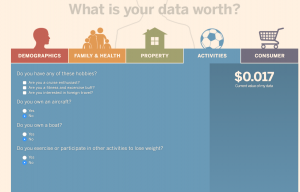 |
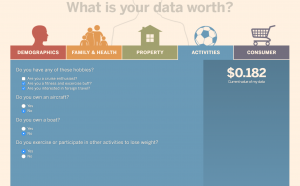 |
Individuals with more interests and hobbies are worth more to these online platforms because advertisers can sell these individuals more products based on these interests. The image below shows that adding more interests increases the value of our data for advertisers.
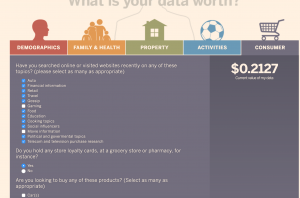 |
While this calculator is not comprehensive, it gives us insight into what type of personal information is valuable to these platforms, and thus, the details these platforms collect about our lives to make profit. And it isn’t just big names, like Facebook or Google, that collect and share information about our digital behavior. Nearly every site you visit tracks, collects, and shares your information- often with third-parties you are not even aware of. If you want a visual of what sites are informed about your visits, and a way to block some of their tracking, the plug-in Disconnect is a privacy tool that shows you how much tracking is going on and gives you a way to block some of this third-party tracking. For the writer of this article, going on to google alerted a long list of sites about her visit onto the search engine. When visiting the Canadian shopping site, Aritzia, another long list of sites is informed about my visit- most of them many of us would have never heard of and some that we may not expect, like YouTube.
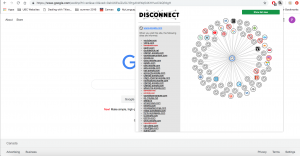 |
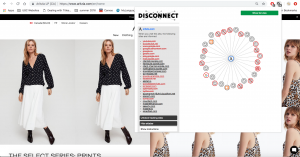 |
Somehow sites like YouTube or Pinterest have an interest in the fact that someone is browsing for a new dress. This just shows how many different sites look to gain from your web surfing. Using plug-ins like Disconnect or web applications like the Financial Times Calculator, you can find out how much you’re worth and who your digital traces have value to- giving you a real idea of what’s going on with your data and why data privacy might matter.
[1] https://ig.ft.com/how-much-is-your-personal-data-worth/#axzz2z2agBB6R

 Follow
Follow



